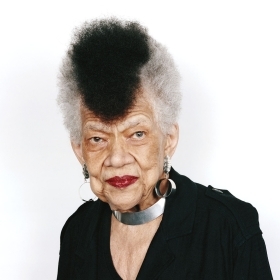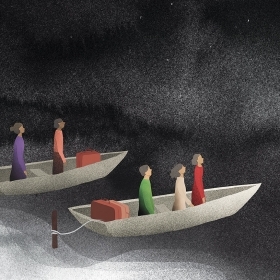“Of all the unanswered questions of our time, perhaps the most important is: ‘What is Fascism?’” wrote British journalist George Orwell in 1944. At that time, a young girl was living in exile in London, having fled the Nazi invasion of Czechoslovakia with her parents. She didn’t learn that three of her grandparents and other close relatives had died in Nazi death camps until weeks after she was sworn in as U.S. Secretary of State in 1997.
In her new book, Fascism: A Warning, that girl, Madeleine Korbel Albright ’59, takes up Orwell’s question anew. “Why, this far into the twenty-first century, are we once again talking about Fascism? One reason, frankly, is Donald Trump,” she writes. “If we think of Fascism as a wound from the past that had almost healed, putting Trump in the White House was like ripping off the bandage and picking at the scab.”
Another concern is that “apprentice autocrats” and undemocratic practices are on the rise in treaty allies such as Turkey, Hungary, Poland, and the Philippines. And even the U.S., “the rock against which Fascism crashed in the last century,” may have begun to slide, she writes.
Albright calls Trump “the first anti-democratic president in modern U.S. history.” She writes that he routinely disparages democratic institutions, including Congress, a free press, and an independent judiciary; vilifies immigrants and Muslims; disregards facts; and systematically degrades political discourse. “We have not had a chief executive in the modern era whose statements and actions are so at odds with democratic ideals,” she adds.
A bit of context is helpful here: Albright was nominated to head the State Department (1997–2001) by President Clinton, who had earlier tapped her to be U.S. ambassador to the United Nations (1993–96). She campaigned for Hillary Rodham Clinton ’69. In fact, Albright writes that she planned this book “with the thought of lending momentum to democracy during Hillary Clinton’s first term.” Trump’s election, she says, just added to her “sense of urgency” to write it.
While much of the buzz about the book turns on Albright’s critique of the president, she insists that the threat to democracy is larger than that. “The nerve-shattering forces at work in the United States and the world today were hardly set in motion by one man. The currents will still be felt long after Trump exits the public stage,” she writes.
So, what exactly is Fascism and how does the world avoid another surge of it? Orwell didn’t find an answer to his own question. Even with Hitler and Mussolini still in power, Fascism as a term had become “almost meaningless,” he wrote. People overused and abused a label once seen as toxic: “For if you examine the press you will find that there is almost no set of people—certainly no political party or organized body of any kind—which has not been denounced as Fascist during the past 10 years.”
Albright agrees with Orwell’s concern. The term “Fascist” is now used to label police, bureaucrats, bloggers, bicyclists, and those who make childproof packaging, as well as rival political parties. Online searches for “Fascism” spiked in the run-up to Trump’s election and have hovered near the top of trending terms for the Merriam-Webster site ever since.
“Disagree with someone? Call him a Fascist and thereby relieve yourself of the need to support your argument with facts,” Albright writes. “If we continue to indulge this reflex, we may soon feel entitled to label as Fascist anyone or anything we find annoying—draining potency from what should be a powerful term.”
She offers her own definition of Fascism—in effect, a template for what to watch out for in public life. “A Fascist is someone who claims to speak for a whole nation or group, is utterly unconcerned with the rights of others, and is willing to use violence and whatever other means are necessary to achieve the goals he or she might have.”
Here be dragons.
Chaddock was for many years the Washington political editor of the Christian Science Monitor.







We ask that those who engage in Wellesley magazine's online community act with honesty, integrity, and respect. (Remember the honor code, alums?) We reserve the right to remove comments by impersonators or comments that are not civil and relevant to the subject at hand. By posting here, you are permitting Wellesley magazine to edit and republish your comment in all media. Please remember that all posts are public.